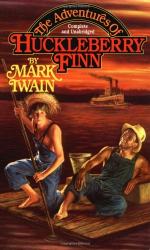|
This section contains 1,263 words (approx. 5 pages at 300 words per page) |

|
Superstition in The Adventures Of Huckleberry Finn
Summary: In the novel The Adventures of Huckleberry Finn by Mark Twain, superstition plays an important role that resurfaces several times throughout the book. The power that superstition holds over Huck and Jim, two otherwise rational characters, demonstrates their childlike nature despite their apparent maturity. In addition, superstition foreshadows the plot at several key junctions, and in the end, superstition is shown to be believable through Huck and Jim's adventure.
Superstition is a word that is often used to explain bad luck, misfortune, the super natural, and the world that is not known. In the novel The Adventures of Huckleberry Finn by Mark Twain, superstition played an important role that resurfaces several times throughout the book. The Adventures of Huckleberry Finn is an ongoing adventure with Huck Finn and his journey to his personal freedom. Superstition is first introduced in Chapter One with a spider crawling on Huck Finn and others all through the novel. Generally, both Huck and Jim are very rational characters, yet when they encounter anything slightly superstitious, irrationality takes over. The power superstition holds over the two demonstrates that Huck and Jim are child-like despite their apparent maturity. In addition, superstition foreshadows the plot at several key junctions. For instance, when Huck spills salt, Pap returns, and when Huck touches a snakeskin with his...
|
This section contains 1,263 words (approx. 5 pages at 300 words per page) |

|


